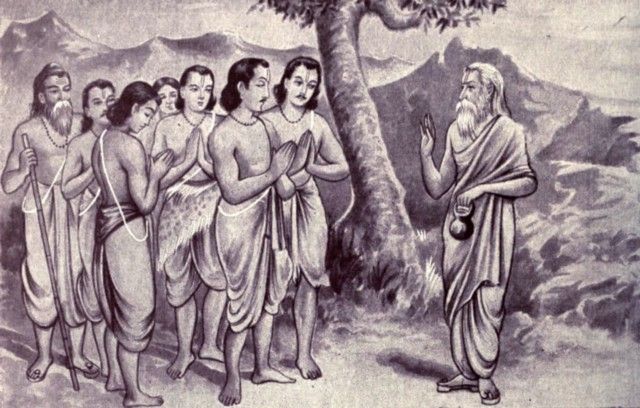How does a man who has lost everything continue to lead a life of dignity and win back everything that was rightfully his? How does he live with himself after losing his kingdom in a game of dice and powerlessly watching his wife is humiliated and assaulted in a royal assembly? What stops him from jumping into the Ganges or sliding into complete depression and being remembered as an insignificant note in history?
The story of Yudhisthira will have enough lessons to help you develop resilience in your own life. He is one of the most polarizing characters in Mahabharata. Most people consider him the weakest link in the Pandava family. Like many, I assumed, that he became king because he was the oldest among the brothers and married Draupadi because Arjuna won her hand in an archery contest. I was listening to a talk on Mahabharata by a spiritual teacher who ridiculed Yudhisthira on many occasions by calling his character and temperament unfit for a ruler. I considered him a side character in the whole series till I read The Mahabharata by Ramesh Menon. The book has a few chapters about how Yudhisthira dealt with all the pain, embarrassment, and humiliation that accompanied the banishment of Pandavas.
After the Pandavas were banished to the forest for thirteen years, they were camped in Kamyaka forest. Krishna heard about their fate and rushed to meet them. His eyes were clouded with anger, and he told Yudhisthira that they should lead a combined army of Dwaraka and Panchala to crush the Kauravas since the whole world knew that Shakuni played with loaded dice. Yudhisthira patiently listened with a neutral expression. He could see the hope rising in the eyes of his family. The war would wash away all the pain, and they would bathe the earth with the blood of Kauravas and their allies. However, he was a man of Dharma. He could never resort to blaming anyone else for his actions. He told Krishna how the sage Ved Vyasa had warned him about fourteen years of misfortune. He stated that Shakuni did not force them to play, and it was his decision, and he had to pay the consequences. He remained impassive as he saw Draupadi break down and narrate the horrors that befell her in the Kuru Assembly. He watched Krishna promise her that the whole Kuru clan would perish as a price for their crime. This was the first time I personally realized why Yudhisthira was called Dharmaraj.
After Krishna’s visit, the Pandavas moved to Dwaitavana to spend time in the company of sages. Those were blissful days, and the company of sages satiated Yudhisthira’s soul. One day the Pandavas were blessed with a visit from the legendary Markandeya rishi. He looked at the Yudhisthira and gave a mysterious smile. Encouraged by his friendliness, Yudhisthira asked why the rishi was not giving him a sad and pensive look that accompanied every visitor who saw the Pandavas. The rishi told Yudhisthira that his fate and grace in accepting the hand of destiny reminded him of the life of Lord Rama. The rishi described how he spent time with Rama. He talked about the grace, strength, humility, and purity of Rama. He said that men such as Rama, Harishchandra, and Bhagiratha were why the sun moved into orbit and the shores contained the sea. The saint paused for a moment and blessed Yudhisthira that he would rule the earth just like they did one day because he was walking the path of Dharma.
While Yudhisthira was happy in the company of saints, Bheema and Draupadi were seething from within. They hated the forest and could not wait for the exile to end. They could not bear that Yudhisthira, the architect of their misfortune, was at complete peace with their circumstances. Bheema had no time for logic or reasoning of Dharma and Karma. He rejected all counsel from Arjuna and the other brothers. Draupadi was the only one who could have helped him, but she was seething in rage and could not see beyond it. Six years passed in stalemate, and one night when no saints were visiting them, Draupadi finally lashed out. She began sobbing incessantly and called Yudhisthira delusional for accepting their circumstances. She compared their living situation in Indraprastha to the straw beds they had today. She compared each of her husbands to gods and described her agony of seeing them waste their lives in the jungle. She then tore into Yudhisthira for forgetting his duties as a warrior and living his dream of being a Brahman. She taunted him for losing his will for revenge or war and finding peace in the saints’ company. Ramesh Menon summarizes her anger in a single sentence. “Her eyes blazed as if they would dry up the lake.”
An ordinary mortal would have succumbed in shame or made a hasty decision. Yudhisthira calmly accepted her words because he lived with that truth within him every day. However, he was a master of his emotions and did not let them dominate his life. He was a Kshatriya but also a Sannyasin at heart. He knew his family had not forgiven him for rejecting Krishna’s offer to attack Hastinapur. He smiled and consoled Draupadi by telling her that this was a time for patience and that he was not an emotionless stone. He reminded her that Dharma would eventually triumph, which angered her even more. She recounted in great detail the humiliation she went through and finally accused him of loving Dharma more than his own family. Yudhishthira did not flinch and replied that he did not know why the goddess chose to bestow him with patience and adherence to Dharma, and he would do his best to prove worthy of those gifts. She was finally silenced, and his saintly temperament prevailed.
As Yudhishtara explained his point of view, the legendary Ved Vyasa walked into their camp. The mood of the whole camp suddenly changed and was charged with a spiritual current. Vyasa explained that they were all alive today because Yudhisthira had exercised patience. The Kauravas had strengthened their alliance and were spoiling for war. Karna, Drona, and Bheeshma were trained by the legendary Parshurama and had access to celestial weapons that could destroy the Pandavas in seconds. His words had the desired impact, and all the brothers felt their resentment against Yudhisthira melt away. Vyasa then advised them about their next steps and blessed Yudhisthira with pratismriti.
When I read these chapters, it completely changed my perception of Yudhishthira. This was not the story of an elder brother who just happened to get everything due to an accident of birth. This was the story of a leader who was kind, compassionate, and fearless in following Dharma.
Applying Wisdom At Work
We are living in challenging times today. Meta has laid off 11000 employees, constituting 13% of its workforce. Twitter let go of 50% of its workforce, and Google has hinted about workforce optimization. Most organizations have announced a hiring freeze, and the thriving technical job market suddenly appears very barren. One of the most challenging jobs you have to do as a manager is to tell employees that they are no longer employed in an organization. Many managers form a close bond with their employees, and this conversation can be gut-wrenching.
When I started managing a team, I had a couple of members in Beijing, China. After a few months, I visited them for a week to personally meet them and discuss plans for the team. They were two of the kindest people I have ever met. They insisted I could not waste the trip simply shuttling between the office and work and had to explore the city every day. We traveled all around Beijing and climbed the Great Wall of China together. One of them became a very good friend. He sat with me below a 200-year-old tree, within the Imperial Garden, and talked about his life, family, and child. I returned to India, and a couple of months later, our company announced a significant restructuring. We were shutting down our entire China business. I was told not to talk to the team as my boss flew down to discuss the situation with them. The organization paid them fairly, but I could not even say goodbye to them. When I called my friend a few days later, he was polite, but I knew we could never connect the same way again. I managed the team for four more years and was a competent manager. Still, something within me shifted after that experience. I created a wall that kept me from being too comfortable or familiar with the team.
The next few months are going to be rough. I have known friends who gave termination notices to hundreds of people before receiving their own notice and making a fresh start. When I look at some of the best people leaders who excelled in tough times, they displayed skills very similar to what we can attribute to Yudhishthira. They were kind, compassionate, and patient, yet they executed their duty perfectly. They knew they were caught up in a web of situations where they wielded little power. They had to execute their duty, but they chose to do it mindfully, and most importantly, they did not delegate it to other people. They led the team with great dignity in the toughest of times.
When it comes to people receiving the pink slip, remember the story of Yudhishthira. He slept as peacefully on a straw bed as he did in his palace. Detachment and his love for Dharma gave him peace. Evaluate your options, polish your skills, and wait for the right time. Success and failure are simply functions of time. You will get your chance to shine again.
Spiritual Wisdom From This Story
How did Yudhishthira continue to walk his path of Dharma despite nature throwing so many obstacles? Was he born with those skills, or can you inculcate them in your lives? The Sri Sukhtam Sadhana, my guru Om Swami conducted, was intense. It shattered me in the first few days, and I am still in the process of remaking myself. This poem by Rumi has been very helpful in the rebuilding process. It’s from the book Rumi — A New Translation — by Farrukh Dhondy. My wife Rashmi read it out to me.
Renewal From the Fall
Without grinding wheat, there can be no bread
No alchemy can turn gold into lead
The surgeon has to use the knife and score
The skin in order to affect a cure
To make a coat, the tailor cuts the cloth
A sheep to slaughter makes the festive broth
The builder has to dig the ruins to build anything new.
The garden’s only filled with roses when the gardener digs the weeds
And turns the soil to plant the New Year’s seeds
And so, my friend, to be remade and whole
Prepare to desecrate your very soul.
My dear guru Om Swami has the best advice on dealing with difficult times. He says that the best way to deal with difficult times is to continue doing the same things you would do when times were good. Time is cyclical and will pass. Your duty is to keep walking.










Comments & Discussion
26 COMMENTS
Please login to read members' comments and participate in the discussion.